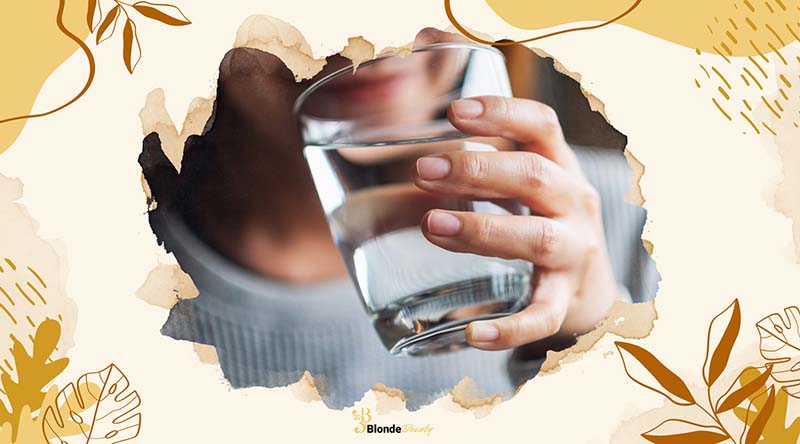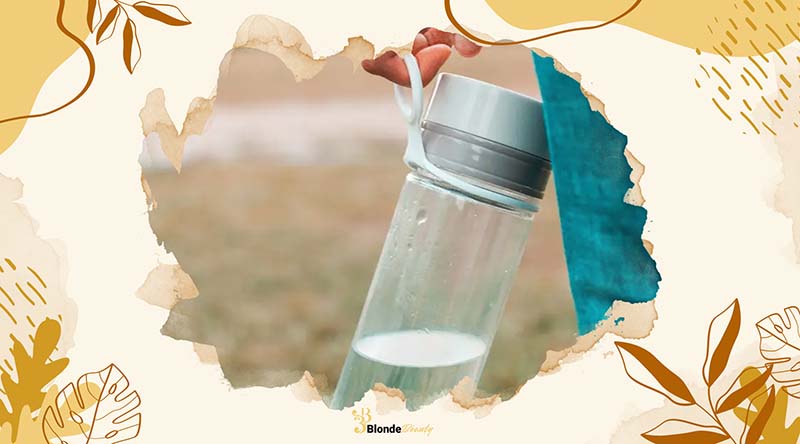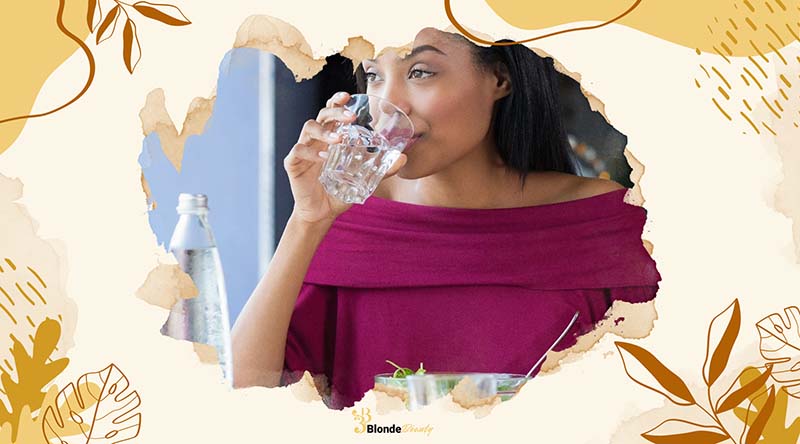Are you on the lookout for a simple, natural solution to reduce hair loss? You might wonder, “Does water help hair growth?” The answer is yes! Water is not only essential for boosting brain function, aiding in weight loss, and improving digestion and skin appearance, but it also plays a crucial role in achieving healthy, lustrous hair.
Our bodies are composed of approximately 60% water, highlighting the significant impact hydration has on our overall health – including the health of our skin and scalp. Not drinking enough water can lead to issues like a dry scalp and dandruff, which often contribute to hair problems. So, how much water should you drink daily to maintain optimal health and prevent hair loss?
If you’ve been exploring the benefits of hydration for your hair, you’ve come to the right place. Grab a glass of water and read on to discover how proper hydration can help you grow thick, long hair and keep your locks looking their best.
Does Water Help Hair Growth?
Definitely! Drinking enough water supports your body’s essential functions, including hair growth. Staying hydrated ensures your hair follicles are nourished, leading to healthy, strong hair instead of dry and brittle strands.
Adequate water intake keeps your scalp hydrated, preventing dryness, itchiness, and dandruff, which supports robust hair growth. Water also aids in absorbing essential vitamins and minerals and helps flush out toxins that can hinder hair health.
In summary, staying well-hydrated is a simple yet effective way to promote and maintain healthy hair growth.
Notes:
- Ensure you’re drinking at least 8 glasses of water daily to support hair growth.
- Staying hydrated also helps maintain the natural moisture balance in your scalp, reducing the risk of hair breakage and split ends.
- For best results, complement your water intake with a nutritious diet rich in vitamins and minerals essential for hair health.

Importance of Water for Your Hair
Proper hydration means maintaining adequate levels of water for your individual needs, allowing your cells, tissues, and muscles to function optimally. Hydration needs vary from person to person due to factors such as age, gender, activity level, and sweat rate. These variables determine whether you fall under the “eight cups a day” guideline or require more.
When you’re properly hydrated, your energy levels are stable, digestion runs smoothly, focus improves, and your urine should be a pale yellow, almost transparent. It’s easier to notice dehydration than proper hydration; by the time you feel thirsty, you’re already dehydrated.
Notes:
- Listen to your body’s signals and adjust your water intake according to your lifestyle and environment.
- Keep a water bottle with you throughout the day to encourage regular sipping and prevent dehydration.
- Proper hydration supports not only hair health but overall well-being, contributing to clearer skin, better mood, and improved physical performance.
How to Hydrate Your Hair for Growth
Drinking water benefits your scalp and hair in many ways. Like the rest of your body, your hair has a high – water content. Staying hydrated replenishes your cells and stimulates hair follicles by aiding vitamin and mineral absorption.
Adequate water intake keeps your hair hydrated, preventing issues like itchiness, dandruff, and dryness. A hydrated scalp helps avoid thinning hair and hair loss.
Dehydration dries out your scalp and halts hair growth. Dry hair becomes prone to split ends and breakage. Drinking water boosts energy transmission from the scalp to hair follicles, stimulating growth and improving scalp conditions for strong, healthy hair.
Water also flushes out toxins that can hinder hair growth. Proper hydration makes your hair appear thicker and fuller, while improving blood circulation and nutrient absorption.
Along with drinking water, consuming water-rich fruits and vegetables, as well as coconut water or fruit juices, provides additional hydration and essential nutrients.
Notes:
- Aim to drink at least 8 glasses of water daily, adjusting for factors like climate and activity level.
- Include hydrating foods in your diet such as watermelon, cucumbers, and oranges to boost your water intake.
- Avoid excessive caffeine and alcohol, which can dehydrate your body and negatively affect your hair health.
Ways Drinking Water Enhances Hair Growth
Drinking water is the easiest way to grow healthy and stronger hair. However, remembering to drink the recommended amount of water daily can be challenging.
Due to busy schedules, many people believe they are drinking enough water, but they are actually dehydrated.
If you’re looking to increase hair growth through water intake, here are some essential tips to help:
Always Carry a Bottle of Water Wherever You Go
Carrying a bottle of water around is an excellent way to encourage consistent hydration throughout the day.
Having water handy wherever you are – whether shopping, in lectures, or at a meeting – allows you to take sips regularly. A reusable water bottle makes this even easier.

Drink a Glass of Water After Each Meal
A simple way to keep yourself hydrated and promote hair growth is by drinking water after each meal.
Developing the habit of taking a glass of water after each meal will help you reach the IOM daily recommended amount of fluid intake. It’s also easy to remember to drink water when you’re at the meal table.

Set Reminders on Your Phone
With busy schedules, it’s easy to forget to stay hydrated, and you might end up not drinking enough water daily. A simple way to always keep hydrated is by setting alarms on your phone.
Set reminders to drink water every 30 or 40 minutes; this will encourage you to grab a glass and stay hydrated.
Eat More Fruits and Drink More Beverages
Many people find it hard to drink water due to its natural taste. If you easily get tired of drinking water, there are other ways to stay hydrated.
Increase your intake of fruits and vegetables, as they are good sources of fluid. You can also swap plain water for green tea or coffee. Just remember that anything containing fluid helps keep you hydrated but avoid drinks with high amounts of sugars and sweeteners.
Notes:
- Start your day with a glass of water to kickstart your hydration.
- Monitor your urine color; pale yellow indicates good hydration, while darker urine suggests you need more fluids.

Recommended Daily Water Intake for Hair Growth
You’ve likely heard that you should be drinking anywhere from 8-12 cups (or three liters) of water a day. However, these are rough guidelines, and the actual amount can vary depending on several factors.
According to the University of Missouri System, you should drink a number of ounces of water equal to half your body weight and add another 12 ounces for every 30 minutes of exercise you do. Of course, factors such as pregnancy or health conditions can affect how much water you need.
The environment can also affect how much water you need to drink. On hot summer days, sweating increases your hydration needs. Similarly, dry winter air can make you drink more water to keep your nose, throat, and sinuses functioning well.
Notes:
- Always consider special conditions like illness or climate changes that might require increased water consumption.
- Staying properly hydrated not only supports hair growth but also benefits your overall health and well-being.
Conclusion
In conclusion, proper hydration plays a vital role in promoting healthy hair growth. Drinking water keeps your scalp and hair hydrated, supports vitamin and mineral absorption, and helps flush out toxins. By following the tips shared, you can enhance your hair’s strength and appearance. So, does water help hair growth? Absolutely!
Have you experienced the benefits of drinking water for hair growth? Share your stories with us! And don’t forget to check out more blogs from Blonde Beauty for additional tips and insights on achieving your best hair ever.
Stay hydrated and enjoy beautiful, healthy hair!

Laureate Professor Clare Collins
Professor Clare Collins is a leading expert in nutrition and dietetics at the School of Health Sciences, part of the College of Health, Medicine and Wellbeing. Her work is changing the way we think about food and health. She grew up as one of nine children and was the first in her family to finish high school and go to college. This background gave her a strong work ethic and a deep appreciation for seizing opportunities.
As the Director of the Hunter Medical Research Institute’s Food and Nutrition Program and a recipient of three NHMRC Research Fellowships, Professor Collins is making a big difference in public health. She focuses on helping people who are often overlooked, using new technologies like apps and online programs to improve their nutrition and reduce the risk of chronic diseases.
Professor Collins is well-respected and has been recognized as a Fellow in four major health and science organizations. She leads a diverse team of experts, including dietitians, computer scientists, and engineers, working together on global health projects.
Her achievements are impressive. She has received over $29 million in research funding, published more than 450 papers, and helped 35 PhD and Master’s students complete their degrees. She’s also active in sharing her knowledge with the public. She has developed tools like the Australian Eating Survey and the Healthy Eating Quiz, and she often appears in the media to talk about nutrition.
PUBLISHED ARTICLES
- Collins, C. (2019). “The Effect of a Pilot Dietary Intervention on Pain Outcomes in Patients Attending a Tertiary Pain Service.”
- Collins, C. (2022). “Variation in cardiovascular disease risk factors among older adults.”
- Collins, C. (2022). “Evaluation of an online intervention for improving stroke survivors’ health-related quality of life: A randomised controlled trial.”
These articles show Professor Collins’s commitment to understanding how better nutrition can improve health. Her work is important for researchers, doctors, and anyone interested in healthy living.
